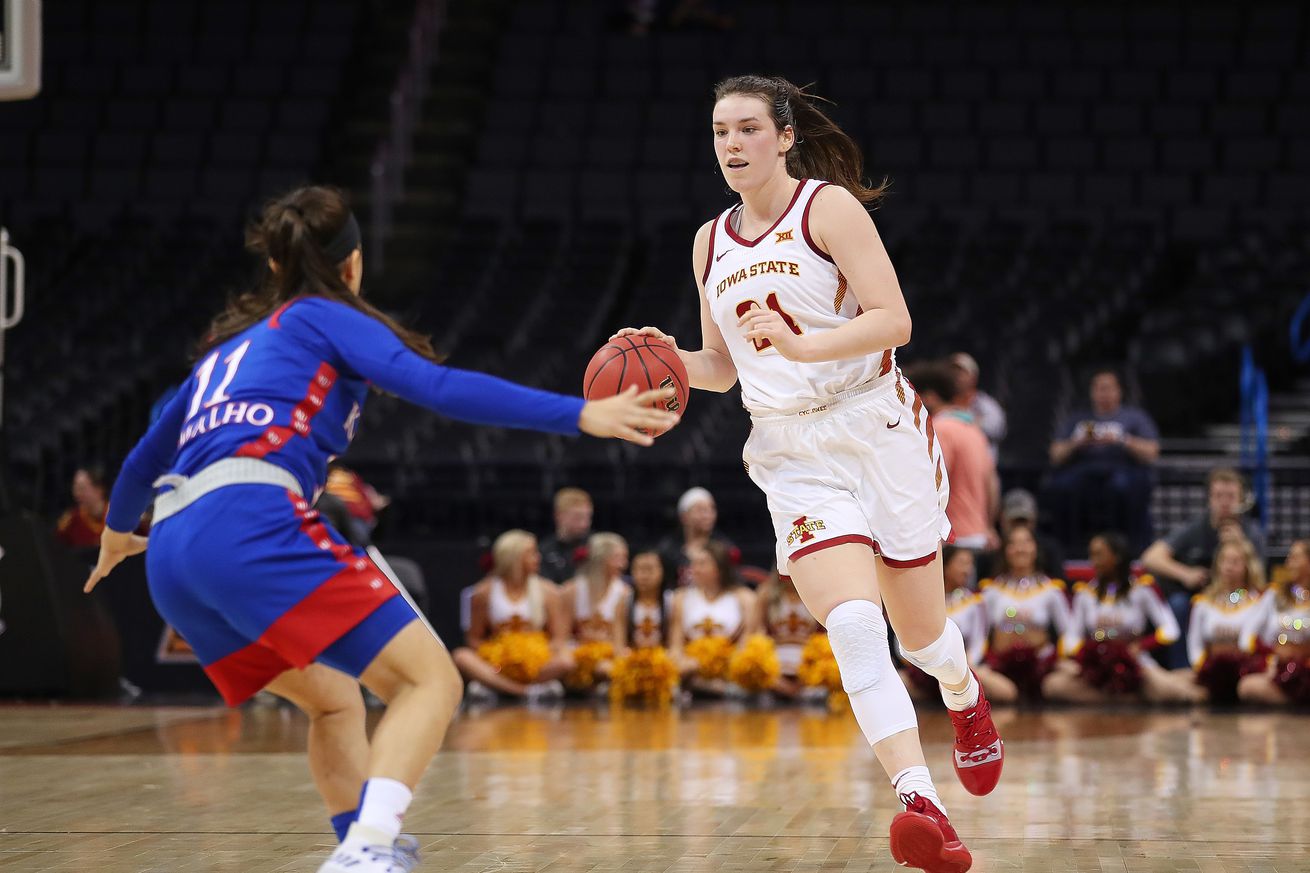
A deep dive into Bridget Carleton’s 41-point game.
A single game of basketball, with timeouts, is more or less two hours long, but there’s always so much more time, effort and energy involved to make the event truly special. In this three-part profile, we take a deep dive into Bridget Carleton’s 41-point game on Jan. 17, 2024, between Serco UNI Győr and KGHM BC Polkowice, to show what needed to happen for the Canadian athlete to make European basketball history.
There was nothing special about Jan. 17, 2024 in the city of Győr. Located in northwestern Hungary, it’s inhabited by a bit over 100,000 people and home to 2023 Hungarian women’s basketball vice-champions, Serco UNI. Győr is one of those university cities, vibrant with young people, whose fresh ideas spring up against the backdrop of historical architecture.
The baroque old town was as beautiful as ever, the Rába River reflected the lightly lit Carmelite church before joining the Danube and becoming part of the second-longest river in Europe, inferior in length only to the Volga. While the Volga is known for its singular devotion and exclusivity to Russia, the Danube connects nine countries, which makes it a true embodiment of European solidarity. It represents a common understanding, acknowledgement and acceptance of different cultures and histories—singular yet ordinary, isolated yet connected.
Tributaries, such as the Rába, sacrifice their individuality for the sake of taking part in something bigger than themselves. That’s the difference between individuality and individualism, the latter being a negative characteristic, socially scrutinized as the egotistical push to be better than others. Individuality, on the other hand, allows one to lead by example, show that certain things are achievable, if approached correctly. Bridget Carleton, the sole Canadian player for Serco UNI Győr, learned to distinguish between the two at an early age from her mother, the best teacher she ever had.
“She is the main reason why I wanted to play basketball. I wanted to follow in her footsteps. I knew from a young age what she was able to do through the sport. She represented Team Ontario and got a Division II scholarship in Michigan, went to school for free, so I knew what was possible thanks to basketball,” says Carleton. “I wanted to be just like her.”
When Carrie Carleton was the head coach at John McGregor Secondary School in Chatham, Ontario, Bridget and her two sisters, Sarah and Rachel, would come to the gym and watch in awe as she was giving directions to her players, either during workouts or actual games. Later, they would try to recreate what they saw in their backyard, playing on miniature hoops. “My parents threw us into all kinds of sports. We played basketball, obviously, we played hockey, volleyball, we played badminton, we played soccer,” reminisces Carleton.
The sisters and their parents remain competitive, regardless of what they’re participating in. The Carletons are pleasant, supportive, generally nice people, but they want to beat their rivals—even when they are bound to them by blood and will have dinner together in an hour, cracking jokes and talking about everyday stuff. “Whatever we played, we always wanted to win,” she says.
And on Jan. 17, Carleton had the same mindset as she entered the court of University Hall of Győr. On that evening, over 4,600 miles from the place she was born, she was facing KGHM BC Polkowice, a team, on paper, superior to hers and headlined by Brianna Fraser, Brittney Sykes and Stephanie Mavunga. Sponsored by the national mining company, blue-collar Polkowice beat Carleton’s Győr in their first meeting of the 2023-24 EuroLeague Women competition by 10 points. While Carleton did not play in that game, neither did Mavunga, who had yet to make a return following the arm injury which kept her away from action for over a year. Now, Mavunga was back.
Apart from besting Győr in a direct duel, Polkowice were 6-5 at this stage of the EuroLeague Women regular season, and a win against the Hungarians would make them almost certain to progress to the quarterfinals. Divided into two groups, the 16 best teams on the continent are playing head-to-head matches, and half of them are eliminated from the competition before the quarterfinals. Carleton’s team was among those already on the outs, having won just one of 11 games, with only three remaining to play.
There’s a history of friendship between Hungary and Poland, which is recognized through a big banner behind one of the baskets. The issue, though, was that the leading players on both teams were neither Hungarian nor Polish. Győr’s point guard, Destiny Slocum, is from Boise, Idaho, while their regular center, Kristine Anigwe, was born in London, but also holds American citizenship. There was no way Carleton and her teammates were going to let Polkowice get an easy win. She’s genetically inclined to stay competitive, regardless of the bigger picture.
Before the game, with music blaring, there were high-fives, hugs and small gifts for the Polish vice-champions, but, on the first play of the game, Carleton stole the ball after Polkowice’s Weronika Gajda was trying to save it from leaving the court. She took a stepback 3, which went in.
“From the drills I did with my mom, I honestly remember a lot of shooting. I only asked her if she would rebound for me, and I did the drills I wanted to do. It was a good environment and I’m thankful for that,” Carleton recalls. “Those are some of my best memories, just being in the gym with my mom and shooting the ball.”
Her parents never pushed her to do anything. When her sisters stepped away from basketball, Carleton’s mom and dad were fine with it, just as they were fine with her continuing to play. And whenever she wanted her help or advice, her mother is there for her. “Her advice is always conversational. She wasn’t the type of coach who shouted. Instead, she talked. She still coaches me when I ask her to, but she always does that in a conversational manner,” says Carleton. Her older and younger sister are there for her too, although in different roles. Sarah and Rachel kept, and continue to keep, Bridget grounded, jokingly downplaying whenever she reaches a certain goal, has a great game or gets another award. They facetime three times a week when she’s in Hungary.
Carleton’s next basket came one and a half minutes into the quarter and her team up 7-2. She got the ball at midcourt from Destiny Slocum and took on Brianna Fraser one-on-one. They’re the same age, both 26, but their careers took very different paths. Born in Brooklyn, Fraser played for a bigger college, Maryland, but wasn’t drafted into the WNBA. She’s yet to make her WNBA debut, although she signed a training camp contract with the New York Liberty in February. In Europe, she’s one of the most sought-after forwards. In 2022, she won various individual and team accolades at ASC Sepsi in Romania. She also plays for the Azerbaijan national team.
Carleton went to Iowa State and, since a young age, has played for Team Canada. “I wasn’t highly recruited when I was in high school. My time with age-group national teams is where I got the most attention. Iowa State was the school that I could tell was extremely invested in me and believed in me and my future. I immediately felt comfortable when I visited so I knew that Iowa State was going to be the place for me,” says Carleton.
“We recruited Bridget VERY hard. We loved her versatile skillset and amazing commitment to doing the work needed to be a great player. She wanted to be coached and pushed to achieve her goals,” says her college coach, Bill Fennelly.
During the play against Fraser, Carleton faked going right, went left and, with the American-Azerbaijani now trying to stop her from behind, she made a layup. On the next offensive possession, Fraser pressured her from the side and Carleton lost the ball, but quickly regained it, as the bounce pass directed at Fraser fell right into her hands. Then, she lured Fraser away from the basket and passed the ball to Cyesha Goree, who played collegiately at Michigan and, since 2017, has held dual citizenship and plays for the Hungarian national team. Goree scored an easy 2-pointer. On the next play, Carleton almost got another steal, as she tipped the ball, but a slight pain in her right shoulder stopped her in her tracks.
Part II of “A night in Győr: Bridget Carleton makes history” will be published tomorrow.





